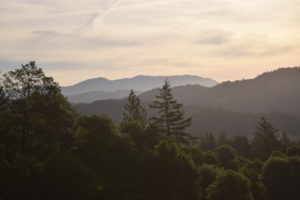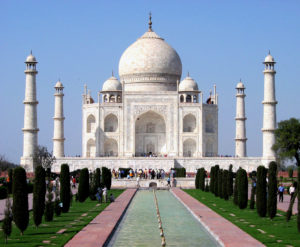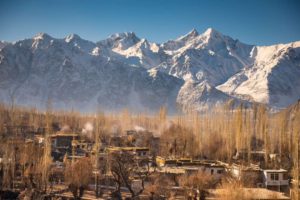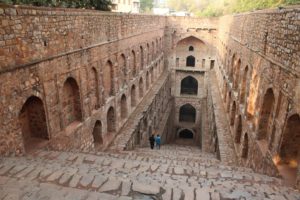Leadership Collective 2017: Student Projects
The 2017 Leadership Collective trip focused on the important theme of Climate Change. Recent events, including the US withdrawal from the Paris Climate Change Accord, has focused attention on this issue. Over 4 months starting with pre-departure assignments, 25 students from the US and India will first prepare for and then participate in a trip where their everyday experiences will be viewed through the lens of Climate Change and particularly with respect to issues related to water.
The 2017 Leadership Collective has been orchestrated by 360Plus and Voygr Expeditions with artistic facilitation from Mumbai based Junoon.
The trip progressed along the following lines:
Pre-Departure Assignments, Learning Objectives, and Outcomes:
The Leadership Collective takes a systems-based approach to learning. In other words, we believe all actions, and inactions, are interconnected on multiple levels (i.e., a personal, local, national, and international level). You can’t talk about climate change without also talking about poverty, racism, economic systems, and technology. Even the smallest, most everyday decisions aren’t made randomly but rather learned and adopted because of a huge range of influences, both subtle and overt, that happen over a lifetime.
Our main goal is to start thinking about why things are the way they are and how students shape and influence the world with their words, decisions, and actions. We have three main themes that we explored before and during the Leadership Collective.
Pre-Departure Assignments:
Assignment #1 – exploring the carbon cycle and its connection to modern development challenges
Assignment #2 – telling and sharing our own inherited stories of the environment and our natural world
Assignment #3 – interviewing someone in their community that makes a difference
Assignment #4– exploring multiple sides of an issue and interviewing each other
In-Country Trip:
This year 360+ has partnered with Junoon to facilitate adeep and lasting impact for the participants through their engagement in regular arts processes. Through the tour, the artist facilitators from Junoon will be working closely with participants, developing their ability to receive and process stories, and develop narratives that stay true to the people and environments being reflected while bringing in their own critical thinking. Participants will develop individual presentations, working within the frameworks of archetypes, metaphors, power and communication (frameworks of listening, processing, making connections, being aware of context and power dynamics, and finally communicating).
US Student Orientation – July 5-9th & Indian Student Orientation – July 7 -10th San Francisco Bay Area; Rancho Mariposa & New Delhi, India
 The goal of orientation is for students to become comfortable with each other and the larger group before beginning the Leadership Collective. Orientation focuses on building our community and reviewing important content before we take off on our journey to and across India.
The goal of orientation is for students to become comfortable with each other and the larger group before beginning the Leadership Collective. Orientation focuses on building our community and reviewing important content before we take off on our journey to and across India.
Delhi – July 10th – 15th including an overnight trip to Agra
 Our time in Delhi explores storytelling techniques and how water has impacted the city’s development. We will cover basic elements ofDelhi’s history like the Mughal empire. We will also visit Agra and seethe iconic Taj Mahal and Agra fort, exploring both through a focus on water and its impact on building, shifting, and changing civilizations.
Our time in Delhi explores storytelling techniques and how water has impacted the city’s development. We will cover basic elements ofDelhi’s history like the Mughal empire. We will also visit Agra and seethe iconic Taj Mahal and Agra fort, exploring both through a focus on water and its impact on building, shifting, and changing civilizations.
Ladakh – July 15th – 29th
 Ladakh will focus on water, traditional agriculture, and how development is shifting Ladakhi traditions and community. Students will stay with Ladakhi host stay families, take water samples, attend school at SECMOL, an alternative and student led institution, learn about Solar technology, and hike through Hemis National Park with a Snow Leopard expert learning about conservation in the Indian context.
Ladakh will focus on water, traditional agriculture, and how development is shifting Ladakhi traditions and community. Students will stay with Ladakhi host stay families, take water samples, attend school at SECMOL, an alternative and student led institution, learn about Solar technology, and hike through Hemis National Park with a Snow Leopard expert learning about conservation in the Indian context.
Delhi – July 29th – 31st
 Guided by the Artist Facilitators, the students will work together to create a final presentation, that brings their individual expressions into a larger collective expression of their shared experience. This presentation will be in the form of multiple expressions – photographs, videos, poems, stories, performances, and so on – and will be shared with an invited audience in New Delhi as the finale to the tour.
Guided by the Artist Facilitators, the students will work together to create a final presentation, that brings their individual expressions into a larger collective expression of their shared experience. This presentation will be in the form of multiple expressions – photographs, videos, poems, stories, performances, and so on – and will be shared with an invited audience in New Delhi as the finale to the tour.
THEMES
1) Hear our voice: creative expression and storytelling
How do you communicate a message effectively? Evoke excitement for an idea? This theme unit will explore creative storytelling techniques: Run through a workshop format which looks at conversations with community members in the US and India: students will explore theatre, movement, puppetry, written, and oral storytelling using the rich history of Indian folklore and the relatively new rise of digital storytelling.
- The students will complete a final group project on the stories and learnings from this trip with support from Junoon
- Develop strategies for dialogue across differences and barriers:
- Discuss basic research methods including determining media bias in articles
- Practice synthesizing and expressing information in creative forms including plays, poems, visual, audio, and video presentations
2) A search for solutions: modern movements and activism in a changing world
This unit focuses on work and actions being taken by people around the world to mitigate, adapt, and address climate change challenges. During this unit, we will meet with activists, scientists, engineers, and individuals striving to address the massive challenge of climate change in forward-thinking ways.
- Individual strategies for reducing our impact on the planet. Possible site visits and meetings.
- Visiting Boon in Delhi, visiting the solar living office in California
- A conversation with Vandana Shiva
- Learn first hand about climate mitigation work done by companies, organizations, and individuals
- Learn about and discuss climate change movements around the world;
- How are feminist, immigrant, racial justice, and climate change connected? where are the possibilities for hope?
- Identify and map your power; what are your circles of influence? How can you use them?
3) Our planet and us: relation to the world
This unit focuses on exploring our relationship to environmental systems with a special emphasis on water’s role in developing our current civilization. This unit will focus on equipping students with the rudimentary scientific understanding needed to clearly explain climate change concepts and understand the earth as an interconnected system. The unit strives to give students an enhanced appreciation for humans’ interconnection with the planet.
- Explain key factors contributing to climate change (carbon emissions, agriculture, over-consumption)
- Explain the impacts of these factors on their own community as well as our host communities in North India
- Articulate basic climate change terminology such as greenhouse gases, alternative energy options, global warming, etc.
- Identify and explain civil society vs state level actors on a local, regional, national, and international level. What are they responsible for? (EPA, UNEP, IPPC, Paris Accords)
- Identify key individual interventions to improve our relationship to the planet. How can we individually make changes that last?
